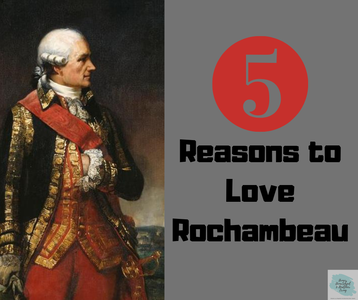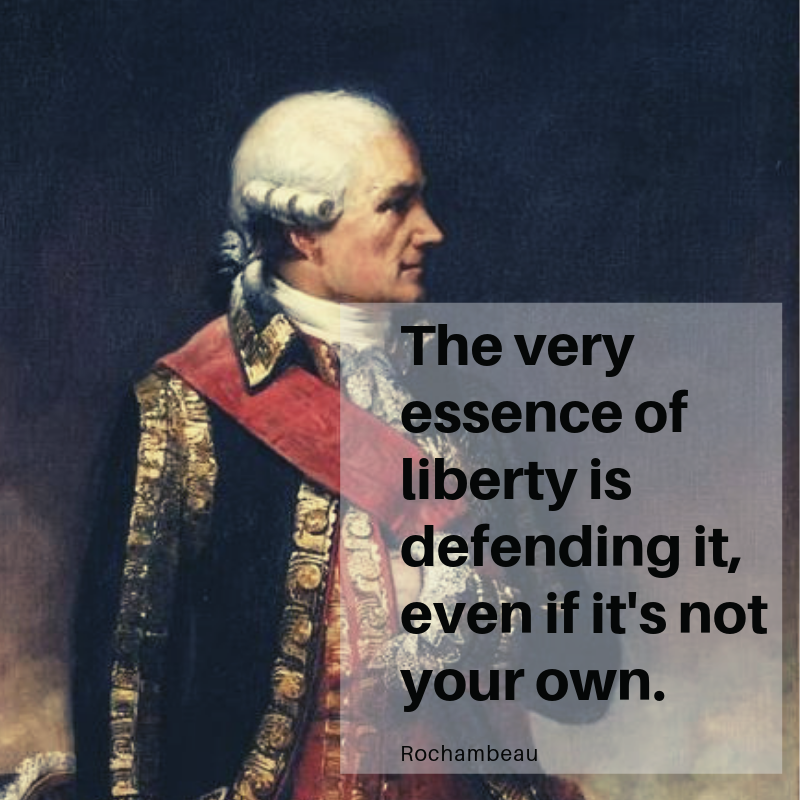 It’s President’s Day here in the US. Besides feasting on a good sale and enjoying the day (or week) off from school, President’s Day is something we normally gloss over with little thought. Hooray for the great leaders in the US, we learned about them in elementary school and left them on the pages of the textbooks, right? Well, this I’ve been thinking about a historic figure that barely gets a few sentences in most history books, yet was crucial to America’s independence. I’m certain George Washington wouldn’t be the George Washington we know and love without Jean-Baptiste Donatien de Vimeur, Comte de Rochambeau. Rochambeau was born in Vendôme, France. From a young age, his father taught him to be tolerant of others opinions, question everything his teachers taught him, and think for himself (Lomask, 37); lessons that would be crucial to his military success. He rose through the ranks of the French military, gaining the admiration of his superiors and inferiors. In a time where soldiers often died under the lash of military punishment, Rochambeau wasn’t in favor of harsh punishments, raising the morale of his soldiers and earning him the affectionate title of, “Papa Rochambeau” (Lomask, 28, 47). As if he doesn't sound endearing enough, I'd love to present the Top 5 Reasons I Love Rochambeau: 1. He was supposed to be in the clergy, not military.
Back in Rochambeau’s day, children were assigned career paths based on birth order. Rochambeau’s older brother Gabriel was supposed to be a great military leader and Jean-Baptiste was sent to a monastery to study and join the clergy. When his brother died suddenly of a fever, Jean- Baptiste was pulled from seminary and thrust into military school- a move that would monumentally impact the War of the Austrian Succession and the American quest for independence. 2. Rochambeau was a man of great honor. When the French troops arrived in New Port, RI, Rochambeau went to great lengths to ensure the townspeople didn’t feel that the French were invading. He sent the rowdiest soldiers across the border to Connecticut, where they’d be less of a nuisance and he allowed his other regiments to camp outside of the city. Rochambeau even brought a special blanket to present to the Native American leaders, to honor the long-standing Franco-Indian trade relationship. 3. Rochambeau only ever received half of what he needed. Rochambeau requested 12,000 troops to carry out his mission in the American Revolution. He only ever received half. In the year he spent in Newport RI, he sent his son, the Vicomte de Rochambeau, to meet with Versailles and request more aide but the response was “no.” Instead, Rochambeau had to make do with what he had to find victory. 4. It was Rochambeau’s idea to go to Yorktown: It’s no secret that the American’s were struggling to win the Revolution. With desertion rates soaring, moral plummeting, and the British victory of New York City and Cornwallis gaining territory in the south, triumph seemed distant. George Washington had his eyes fixed on regaining control of New York, but every scrimmage ended with the loss of life and moral. Rochambeau advised Washington against going after General Clinton, but the advice fell on deaf ears. Finally, Rochambeau sent a message to Admiral de Grasse, telling him to take his fleet to the Chesapeake Bay. Then, Rochambeau stressed to Washington that it was imperative they march down to Yorktown to meet de Grasse. Washington agreed, and they heroically crossed the Delaware river, marched to Yorktown, and won the American Revolution. Without Rochambeau’s quick thinking, Washington might have continued to go after Clinton, losing more life, any hope of victory. 5. Rochambeau was almost beheaded in the French Revolution. After his military career, Rochambeau was honored by Louis XVI and became governor of Picardy. When the Reign of Terror occurred, an aged Rochambeau was herded out of retirement and brought to Paris to be executed. It’s recorded that there was an outcry when Rochambeau entered the prison. Everyone who knew him, or knew of him, cried out for the release of “Papa Rochambeau.” Napoleon pardoned the war hero and he returned to him home to live out his final days in peace. References: Lomask, M. (1965). Rochambeau and our French allies. New York: P. J. Kenedy & Sons. Ruppert, B. (2016, November 04). The Three Letters that determined the Campaign to Yorktown. Retrieved from https://allthingsliberty.com/2016/11/three-letters-determined-campaign-yorktown/ Selig, R. A. (2007). March to victory: Washington, Rochambeau, and the Yorktown campaign of 1781. Ft. McNair, DC: U.S. Army Center of Military History.
2 Comments
DeAnna
4/29/2020 10:38:19 am
Thanks, some of the info helped with my homework!
Reply
Leave a Reply. |
Alexandrais a writer & tired homeschooling mom of five. Categories
All
Archives
November 2022
|



 RSS Feed
RSS Feed
